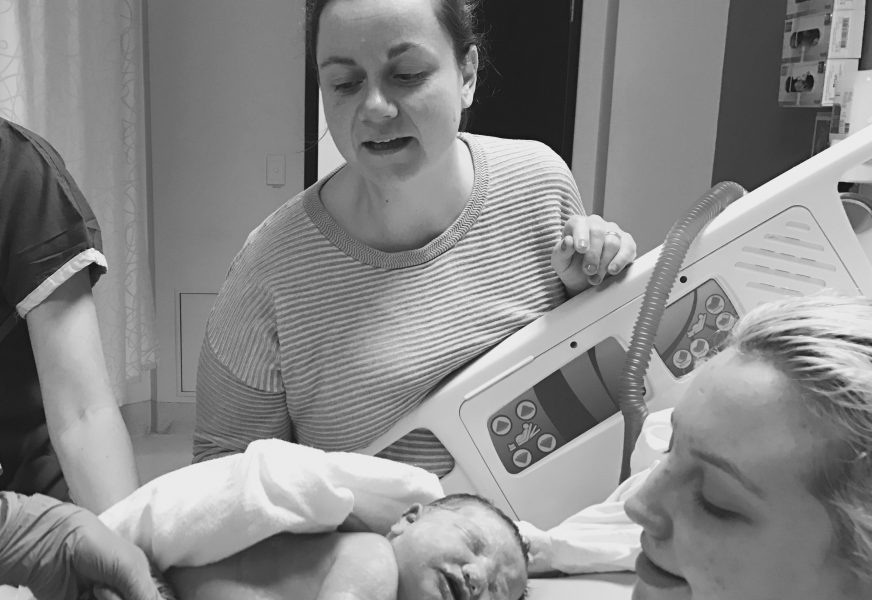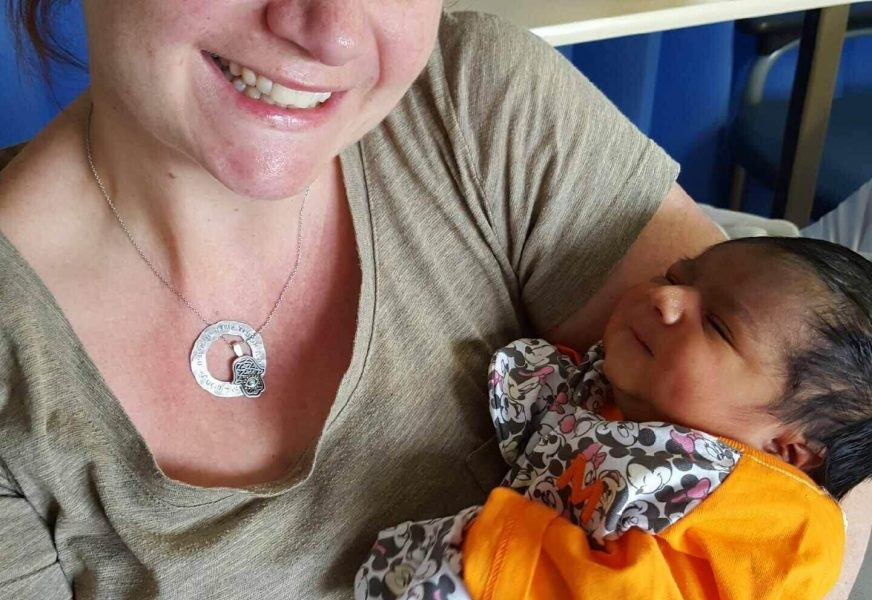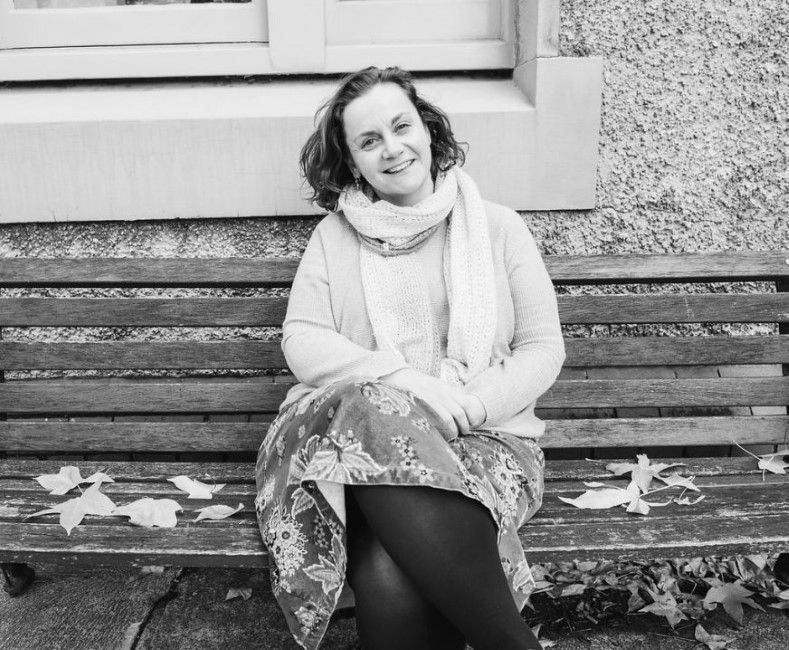Tanya, thanks for taking time to talk to us for World Doula Week! We’d love to hear a little more about your background. What would you like to tell us?
I was born and raised in Hong Kong, where my parents lived for years. I lived there on and off until my early 20s when I came to Australia for a few years, which is where my parents were from. But I’ve also spent time living in Singapore, in the UK and for many years in Israel as my husband is Israeli. I’m a little bit from all over the place!
I came to this work as a childhood educator and doula almost by accident. It wasn’t something I necessarily set out to do, and it wouldn’t have been my answer if you’d have asked me what I thought I would be when I grew up. I’d worked for many years in the performing arts industry, in marketing primarily. In fact, years and years ago when I was still living in Hong Kong, I worked as a voice-over artist dubbing cartoons, book recordings, TV commercials, all sorts of things. I even voiced one of the female Transformers for a few years!
That really does go to show how multi-talented our volunteer doula team is! So how did you end up on the birth work path?
I think the whole birth thing came about because of having kids and that experience. My husband and I were living in Israel at the time and we were really lucky to find an amazing childhood educator who taught a Lamaze class that we attended. It was incredibly illuminating and valuable information that we got and, I think looking back, particularly because it was my first child and it was not an easy birth by any means, that had I not had the tools and information that I got from that class, we both would’ve really floundered.
Having knowledge, information, and learning all about things like doulas that I didn’t know about until I did a childbirth class really helped. We ended up having a doula, an amazing doula, and together with the woman whose Lamaze classed I attended, they completely changed the professional direction of my life, which I’ll be forever grateful for. It was doing that class and having two children in 12 months in Israel, that turned me into a childbirth educator.
Incredible. So, like a lot of women, you first learned about what a doula is when you were pregnant with your first child?
Yes, the first time I’d ever heard the word and understood what a doula was, was in my childbirth class when I was pregnant with my son. When I got told that there is this person who can be there to support you in the lead up to labour, is there with you throughout labour and birth, will support you in those early days and weeks afterwards when you go home with a new baby and that’s there with you throughout — that was what sold me; that continuity of care. Israel, while it has a very good maternity care system, it’s like every other system around the world in that midwives are busy and under the pump and they’re often caring for several women at different stages of labour, so there’s lots of coming and going. For me there was also the language barrier, particularly in labour. It’s not a time I want to be doing simultaneous translation in my head. I was stressed and I was emotional and it was really important to me to have somebody that I could communicate with who was with me the whole time. That made my experience so much better and so much more positive than it potentially could have been.
It was also interesting though in Israel because of the population there, particularly in the religious orthodox Jewish community, it’s normal. It’s the norm for the father of the baby not to be in the birth space for very long, perhaps only in the earlier parts of labour and at the very least behind a curtain. But more often than not, actually out of the room altogether. So there has always been a tradition amongst, not just Orthodox Jews, but certainly many traditions around the world where birth has always been ‘women’s business’. So, even though the word ‘doula’ has been around a long time, and gets called different things, the concept has been around forever and certainly is very familiar and an accepted part of birth in Israel.
So for me, bringing a doula with me to my birth, nobody batted an eyelid. It would be more unusual had I not brought somebody with me. There’s really a very wide acceptance of the role of a doula there, which was great. I think having had that personal experience with my first child just sold me for the rest of my life on how important doulas are for all women.
Tell us about the process of becoming a doula yourself – how long have you been a doula and volunteered at Birth for Humankind?
My doula work really started with Birth for Humankind. I came on board in 2015, when Birth for Humankind was just starting out. I had seen something on Facebook that caught my attention and straight away I just thought ‘I really, really want to know more about what this organisation is all about’.
Birth for Humankind was established in 2014 by two incredibly talented women and practicing doulas, Mei Lai Swan and Kirstan Flannery. Our doula support program has since provided over 200 women with free doula support.
I think I had always thought that, at some point, I would add doula support work to what I was already doing in birth education. It’s an obvious pairing! But because my children were so little, it just wasn’t practical for me to be attending and supporting births. However, as they started to get older, my circumstances changed and doula work became something that I really, really wanted to do more of. I also felt very much that, as an educator, it was really important for me to know and have an experience of what was going on in birth suite. Especially because I hadn’t had my own children here I felt like I was teaching couples about the experience of giving birth in Melbourne and I really didn’t have a visual or a personal experience of that space.
[To be a volunteer doula with Birth for Humankind] was a wonderful opportunity, seeing it come up on Facebook was perfect timing, a perfect opportunity. Since becoming a volunteer doula I have also gone on to support private clients as well.


That’s incredible! We love hearing that something as simple as a Facebook post could prompt a whole new opportunity for you. Do you think you could describe, in a few sentences, why doulas are so important?
I think doulas are the missing part of the puzzle in maternity care. We may never have a fabulous, gold standard of maternity care in this country, or any country, but the one thing that is never going to be affected by a hospital’s internal protocols and staffing issues and budgetary restrictions is DOULAS!
Doulas are always going to be there and they don’t care about all that stuff, they don’t bring all that baggage with them, or at least they shouldn’t. They’re coming in as an independent voice and are free of those restraints of working in an institution. They can be what the epitome of a midwife is, the essence of what a midwife is, which is to be with woman and care for her and her baby, but without the medical responsibility. It’s an amazing role.
I think that we do have to recognise that we have a very fragmented maternity care system in Australia and, at the end of the day, what can make the most significant difference is to have that continuity of care, to have that doula with her.
In addition to our Doula Support Program, Birth for Humankind also runs Education Programs, which includes Mothering 101, a peer support and education course for young pregnant women, and a series of workshops for newly arrived migrants and women from refugee and asylum seeker backgrounds called Navigating the Maternal Health System in Australia.
Australia is a little bit behind other parts of the world where doulas are really a part of the fabric of childbirth and I’ve noticed even in the last five or six years that the awareness of what doulas are and what they do has grown exponentially, which is a really good thing.
The thing is — if you’re fortunate enough to have an absolutely textbook pregnancy, labour, birth and everything just goes according to plan [then the system works fine]. But how often does that happen? Like almost never. More often than not, especially today, women are navigating a very medicalised birth environment. It’s a very hard and confusing system to navigate. I mean most people don’t come into this with that much knowledge and experience and understanding of hospital policy and protocols, you can read What to Expect When You’re Expecting from cover to cover a hundred times and still not even be remotely prepared for the reality of giving birth in our hospital system today. I think that’s where doulas play a critical role, together with good education.
If the only thing that a woman can ensure is that she has a great doula who’s there for her and has her back the whole way it goes a long way to ensuring a better birth experience. Obviously outcomes are very important, but I think that more complex situations can be dramatically improved if a woman is supported by a doula. They’re priceless. I don’t think you can put a value on how important they are.
OK that was more than a few sentences…
That’s OK! What a great answer! What would you say are some of the biggest misconceptions about the role of a doula?
One of the big misconceptions about doulas, particularly from a partner’s perspective, is that somehow they replace them. We can be there as much for that woman’s partner or family as we’re there for her. I’ve been in situations as a doula where things have been very stressful and there’s a lot of emotion in the room and a lot of fear. You see it on the partner’s face, you visibly see their anxiety and that sense of helplessness and being out of control, and it’s very frightening for them. So to be there with them, to help explain things and to calm and reassure them is, again, the role of a doula. Many people don’t often think about doulas like that because we are obviously there for mum, but sometimes we’re there with dad or mum’s family and keeping them calm and reassuring them. I see doulas as this glue, if you like, kind of holding mum and her family together.
I also think that we need to promote what doulas do by leading by example and working really ethically with a great understanding of the scope of practice and code of ethics. We need to show the professional health care team that we’re not there to step on their toes, we’re there only to enhance and further support their work. At the end of the day, we all want the same thing, which is for that woman to feel safe and supported throughout her birth experience.
Spot on! We’d love to hear more about your experiences supporting women through Birth for Humankind. Firstly, why do you think the support of a doula is so important for women experiencing social and economic disadvantage?
This is why I was so drawn to Birth for Humankind in the first place because, and as an educator as well, I have a particular interest and passion in making sure that women who traditionally might not be able to access quality evidence-based birth education have the opportunity to do so. A lot don’t and there’s different reasons for that. But in Birth for Humankind, I very much found an organisation that really shared my values and my perspective and what I consider important in this space.
We only need to look at the statistics to see that women who fair the worst [in terms of maternal health outcomes] in Australia are women who come from new migrant backgrounds, refugee and asylum seeker backgrounds, as well as Indigenous women. Don’t get me started on some of the gross inequities there… but yeah, I just know that all women absolutely benefit from and deserve a doula.
ALL WOMEN SHOULD HAVE CONTINUOUS SUPPORT DURING LABOUR FROM A PERSON WHO IS PRESENT SOLELY TO PROVIDE SUPPORT, IS NOT A MEMBER OF THE WOMAN’S SOCIAL NETWORK, IS EXPERIENCED IN PROVIDING LABOUR SUPPORT, AND HAS AT LEAST A MODEST AMOUNT OF TRAINING, APPEARS TO BE MOST BENEFICIAL.
Cochrane Study, 2017
When you are so far behind the eight ball and you’ve got so many barriers in front of you, you know, your doula might be the one person who’s genuinely there for you.
I see on the faces of some of the women that I’ve supported that there’s a lot of mistrust, which is completely understandable given their history. Having somebody that is not a threat to them and we’re just purely there, there’s no hidden agenda, we’re just here for you and that’s it, no more no less. I think once they get that, we really become something very valuable to them.
What women often find is that their care is so fragmented that nobody ever really gets to know them or understand them or has a sense of who they are. That is our incredible opportunity as a volunteer doula for Birth for Humankind. Obviously we don’t know her whole story, we never will, but we can know some of it.
What are some of your favourite parts of your role as a volunteer doula?
Being invited into the birth space is a real privilege. To see a baby coming into the world is just phenomenal, it gets you every single time. I also love the postpartum work. I love being able to support women and nurture them during that period. You just know how hard it is in those early days and weeks, how utterly exhausting it is, so having somebody there who you’ve built a relationship with, they know you, you’ve been with them in some really intense moments, and you just see how happy they are to see you with their baby after they’ve gone home. It’s really comforting for them.
Is there a particular story or experience of supporting a woman through Birth for Humankind that you would like to share?
One client in particular that I had I just became really close and connected with. She was a young mum, second baby, and she’d been dealt some very difficult cards in her young life. She was in the midst of overcoming some pretty intense issues and obstacles and being a single mother already with a young little boy and then being thrown into it all again with a second child with basically no support, no family support whatsoever. I guess we don’t know exactly what to expect until we’re matched with women as their doula but there was just something about this young woman, something really connected me to her.
Her first birth was very traumatic for her, really traumatic, and her one wish was that this birth would not leave her in that same state. She had some very strong ideas about what she wanted, what she didn’t want, and I was so happy for her that she got the birth that we had worked really hard to ensure that she would have. I think what she needed was to be shown that she was incredible, she was so much stronger than she gave herself credit for, and that she had those skills, and she could do it again. She just needed somebody there that could remind her that she was more than capable.
It made me feel so proud to see her come into her own and I could close the relationship feeling really happy that she was going to be okay. I just knew in my heart that she was going to be fine. She was really special.
That’s beautiful. 28% of the women we support are young mums and a massive 70% of women in the last year are lacking a support person. We are so glad to be able to show them that things can be different with the support of volunteer doulas like you.

